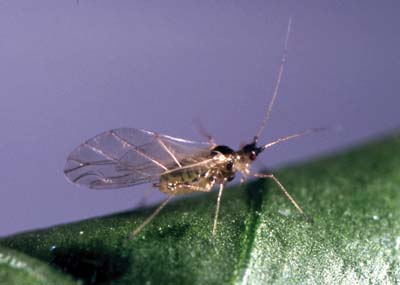To save the Web-optimized images shown below to your hard drive:
|
Click to access Display and Print quality images. |
Vegetable crops that serve as hosts are those found in the plant families Solanaceae, Chenopodiaceae, Compositae, Cruciferae, and Cucurbitaceae. When plants are infested, they will have a reduced growth rate, wilt, and appear water stressed. Natural enemies include lady beetles, syrphids, lacewings, and parasitic wasps. Conservation of these natural enemies by avoiding the use of broad-spectrum insecticide can result in good control of aphids. Vegetable fields should be monitored/sampled weekly for green peach aphid as well as the natural enemies. Systemic insecticides are commonly used to suppress populations in crops where the aphids directly damage the crop, but resistance will appear faster if pesticide is used repeatedly. Insecticides are of little value in reducing spread of viruses vectored by green peach aphid with few exceptions. Insecticidal soaps may also be used. Removal of alternate hosts (especially in greenhouses) and removal of overwintering sites can reduce problems with green peach aphid. Reflective mulches and floating row covers can slow spread of aphid-vectored plant viruses.
Images
To save the Web-optimized images shown below to your hard drive:

Green peach aphid, Myzus persicae, winged adult.
(Photographer: L. Buss., University of Florida)
Click to access Display and Print quality images.
|
Click to access Display and Print quality images. |